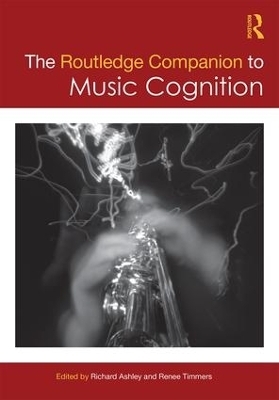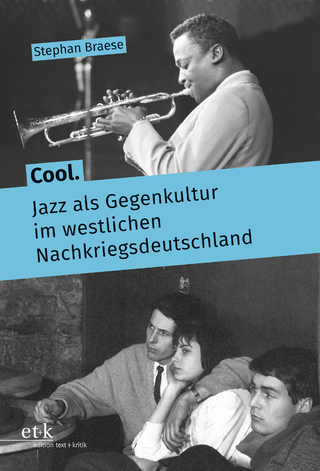
The Routledge Companion to Music Cognition
Routledge (Verlag)
978-1-138-72105-0 (ISBN)
The Routledge Companion to Music Cognition addresses fundamental questions about the nature of music from a psychological perspective. Music cognition is presented as the field that investigates the psychological, physiological, and physical processes that allow music to take place, seeking to explain how and why music has such powerful and mysterious effects on us. This volume provides a comprehensive overview of research in music cognition, balancing accessibility with depth and sophistication.
A diverse range of global scholars—music theorists, musicologists, pedagogues, neuroscientists, and psychologists—address the implications of music in everyday life while broadening the range of topics in music cognition research, deliberately seeking connections with the kinds of music and musical experiences that are meaningful to the population at large but are often overlooked in the study of music cognition. Such topics include:
Music’s impact on physical and emotional health
Music cognition in various genres
Music cognition in diverse populations, including people with amusia and hearing impairment
The relationship of music to learning and accomplishment in academics, sport, and recreation
The broader sociological and anthropological uses of music
Consisting of over forty essays, the volume is organized by five primary themes. The first section, "Music from the Air to the Brain," provides a neuroscientific and theoretical basis for the book. The next three sections are based on musical actions: "Hearing and Listening to Music," "Making and Using Music," and "Developing Musicality." The closing section, "Musical Meanings," returns to fundamental questions related to music’s meaning and significance, seen from historical and contemporary perspectives. The Routledge Companion to Music Cognition seeks to encourage readers to understand connections between the laboratory and the everyday in their musical lives.
Richard Ashley is Associate Professor of Music Theory and Cognition at Northwestern University, where he also holds appointments in Cognitive Science and Cognitive Neuroscience. Renee Timmers is Reader in Psychology of Music at the Department of Music, The University of Sheffield, UK, where she directs the research center, "Music, Mind, Machine in Sheffield."
Part 1: Music from the Air to the Brain1 Music from the Air to the Brain and Body (EDWARD W. LARGE )2 Music and the Brain: Areas and Networks (PSYCHE LOUI AND EMILY PRZYSINDA )3 Music in the Brain: Imagery and Memory (REBECCA S. SCHAEFER)4 Music in the Brain: Music and Language Processing (MIREILLE BESSON, MYLÈNE BARBAROUX, AND EVA DITTINGER) 5 Music and the Brain: Music and Cognitive Abilities (REYNA L. GORDON AND CYRILLE L. MAGNE )6 Music, Brain and Movement: Time, Beat and Rhythm (MOLLY J. HENRY AND JESSICA A. GRAHN)7 Music and Health: Physical, Mental, and Emotional (SUVI SAARIKALLIO) 8 Music and Healing Processes: Music Therapy (JÖRG FACHNER) 9 Music, Pleasure, and Social Affiliation: Hormones and Neurotransmitters (RONI GRANOT)Part 2: Hearing and Listening to Music10 Musical Structure: Time and Rhythm (PETER MARTENS AND FERNANDO BENADON)11 Musical Structure: Sound and Timbre (STEPHEN MCADAMS AND MEGHAN GOODCHILD)12 Musical Structure: Tonality, Melody, Harmonicity, and Counterpoint (DANIEL SHANAHAN)13 Musical Structure: Melody, Texture, and Harmony in the Classical Tradition (ROBERT GJERDINGEN)14 Harmony and Melody in Popular Music (DAVID TEMPERLEY AND TREVOR DE CLERCQ)15 Musical Structure: Form (RICHARD ASHLEY)16 Music Production: Recording Technology and Acousmatic Listening (RAGNHILD BRØVIG-HANSSEN AND ANNE DANIELSEN) 17 Musical Connections: Absolute Pitch (ELIZABETH WEST MARVIN)18 Musical Connections: Crossmodal Correspondences (ZOHAR EITAN)19 Musical Connections: M
| Erscheinungsdatum | 04.07.2017 |
|---|---|
| Reihe/Serie | Routledge Music Companions |
| Zusatzinfo | 4 Tables, black and white |
| Verlagsort | London |
| Sprache | englisch |
| Maße | 178 x 254 mm |
| Gewicht | 290 g |
| Themenwelt | Kunst / Musik / Theater ► Musik ► Musiktheorie / Musiklehre |
| Geisteswissenschaften ► Psychologie ► Allgemeine Psychologie | |
| Geisteswissenschaften ► Psychologie ► Verhaltenstherapie | |
| Naturwissenschaften ► Biologie ► Zoologie | |
| ISBN-10 | 1-138-72105-0 / 1138721050 |
| ISBN-13 | 978-1-138-72105-0 / 9781138721050 |
| Zustand | Neuware |
| Haben Sie eine Frage zum Produkt? |
aus dem Bereich


